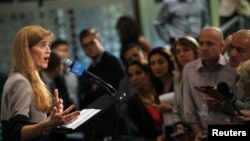UNITED NATIONS —
U.S. ambassador to the United Nations Samantha Power declared Thursday that the United States has abandoned efforts to work with the United Nations Security Council on Syria and accused Russia of holding the 15-nation panel "hostage."
Addressing news media following a briefing of Security Council members on U.S. intelligence regarding an August 21 chemical attack in Damascus that killed 1,400 civilians, Power said she sees "no viable path forward" on the Syria crisis in the Security Council, which has been paralyzed on the issue for more than two years.
She said President Barack Obama has formulated with some U.S. allies a planned response to the recent attack, which Washington says was perpetrated by the regime of Syrian President Bashar al-Assad.
Her remarks come a day after Obama cleared his first hurdle in winning Congressional approval for a possible military strike on Syria. Power told reporters that the United States has tried every avenue in the international body to get action on Syria since 2011, but has been blocked by Russia, whom, along with China, has already vetoed three Security Council resolutions that would have punished Assad's government.
She said the United States believes the U.N.’s most powerful organ should live up to its obligations and act, but that the system has failed.
"Instead, the system has protected the prerogatives of Russia; the patron of a regime that would brazenly stage the world's largest chemical weapons attack in a quarter century, while chemical weapons inspectors sent by the United Nations were just across town," she said.
In a sign of the increasingly tense relations between Washington and Moscow, Power accused Russia of holding the Security Council hostage and of shirking its international responsibilities, including as a party to the international convention banning chemical weapon use.
Obama, who is currently in St. Petersburg attending the G20 summit, has no plans at present for one-on-one meetings with his Russian counterpart, Vladimir Putin, and photos of the two leaders’ initial greeting indicated a cooling of their relationship.
U.N. Secretary-General Ban Ki-moon is also at the G20 along with his special envoy on Syria, Lakhdar Brahimi. Ban said the recent allegations of chemical weapons use and the deteriorating humanitarian situation urgently require world leaders to address the situation in Syria.
"That is why I have asked Joint Special Envoy Lakhdar Brahimi to join me in St. Petersburg, to press for the early convening of Geneva II conference," he said. "There is no military solution, there is only a political solution which can bring peace and end this bloodshed right now."
Power said that it would be difficult to get the parties to Geneva in the wake of such "a monstrous gas attack." She said a military response to the August 21 attack would not suggest that there is a military solution to the conflict, and she underscored that there is no long-term solution for Syria that does not include a political solution.
Addressing news media following a briefing of Security Council members on U.S. intelligence regarding an August 21 chemical attack in Damascus that killed 1,400 civilians, Power said she sees "no viable path forward" on the Syria crisis in the Security Council, which has been paralyzed on the issue for more than two years.
She said President Barack Obama has formulated with some U.S. allies a planned response to the recent attack, which Washington says was perpetrated by the regime of Syrian President Bashar al-Assad.
Her remarks come a day after Obama cleared his first hurdle in winning Congressional approval for a possible military strike on Syria. Power told reporters that the United States has tried every avenue in the international body to get action on Syria since 2011, but has been blocked by Russia, whom, along with China, has already vetoed three Security Council resolutions that would have punished Assad's government.
She said the United States believes the U.N.’s most powerful organ should live up to its obligations and act, but that the system has failed.
"Instead, the system has protected the prerogatives of Russia; the patron of a regime that would brazenly stage the world's largest chemical weapons attack in a quarter century, while chemical weapons inspectors sent by the United Nations were just across town," she said.
In a sign of the increasingly tense relations between Washington and Moscow, Power accused Russia of holding the Security Council hostage and of shirking its international responsibilities, including as a party to the international convention banning chemical weapon use.
Obama, who is currently in St. Petersburg attending the G20 summit, has no plans at present for one-on-one meetings with his Russian counterpart, Vladimir Putin, and photos of the two leaders’ initial greeting indicated a cooling of their relationship.
U.N. Secretary-General Ban Ki-moon is also at the G20 along with his special envoy on Syria, Lakhdar Brahimi. Ban said the recent allegations of chemical weapons use and the deteriorating humanitarian situation urgently require world leaders to address the situation in Syria.
"That is why I have asked Joint Special Envoy Lakhdar Brahimi to join me in St. Petersburg, to press for the early convening of Geneva II conference," he said. "There is no military solution, there is only a political solution which can bring peace and end this bloodshed right now."
Power said that it would be difficult to get the parties to Geneva in the wake of such "a monstrous gas attack." She said a military response to the August 21 attack would not suggest that there is a military solution to the conflict, and she underscored that there is no long-term solution for Syria that does not include a political solution.




